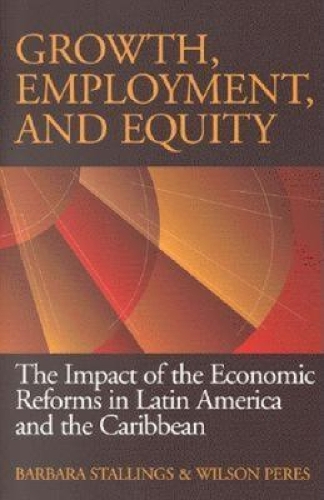
Growth, Employment, and Equity: The Impact of the Economic Reforms in Latin America and the Caribbean
(Paperback)
Publishing Details
Growth, Employment, and Equity: The Impact of the Economic Reforms in Latin America and the Caribbean
By (Author) Barbara Stallings
By (author) Wilson Peres
Bloomsbury Publishing PLC
Brookings Institution
1st June 2000
United States
Classifications
Professional and Scholarly
Non Fiction
Economics of specific sectors
Economic geography
Central / national / federal government policies
Political economy
338.98
Physical Properties
Paperback
272
Width 152mm, Height 229mm, Spine 19mm
376g
Description
"
In the last ten to fifteen years, the Latin American and Caribbean region has undergone the most significant transformation of economic policy since World War II. Through a series of structural reforms, an increasing number of countries have moved from closed, state-dominated economies to ones that are more market oriented and open to the rest of the world. Policymakers expected that these changes, in conjunction with lower rates of inflation and increased spending in the social area, would speed up economic growth, increase productivity, and lead to the creation of more jobs and greater equality. Have those expectations been fulfilled Analyzing the impact of the reforms in nine countries (Argentina, Bolivia, Brazil, Chile, Colombia, Costa Rica, Jamaica, Mexico, Peru), this study provides a detailed picture of progress to date. At the overall regional level, the book suggests, the reforms have had a surprisingly small impact: a small positive impact on investment and growth, and a small negative impact on employment and income distribution. But at the country, sectoral, and microeconomic levels, it finds evidence of strong effects, with some units doing very well and others falling behind.
"Reviews
"The present work lays down a firm conceptual and empirical basis with which to systematically investigate the relationships between social expenditure, social development and economic growth. It would be immensely useful to examine and hypothesise on the nature of casuality between these variables." Ananya Mukherjee Reed, York University, Toronto, European Journal of Development Research, 12/1/2001
|"The great value of this study... lies in the authors' conscious effort to go beyond mere macroeconomic aggregates to embed reforms in the national and international contexts in which they were implemented. The results constitute an invaluable reminder of how the reforms interacted with other variables to produce policy outcomes." Pamela K. Starr, Instituto Tecnologico Autonomo de Mexico, Latin American Research Review, vol. 37, no. 2; 2002
|"[This] book should be read by anyone wishing to understand and improve upon the dynamics of neoliberal restructuring in the Americas." Ian Robinson, University of Michigan, Industrial Relations, 2002, v. 57 no 3
Author Bio
Barbara Stallings is William R. Rhodes Research Professor at Brown University's Watson Institute for International Studies. Wilson Peres is head of the Industrial and Technological Unit of ECLAC. He is coeditor of a special issue of World Development entitled "The Microeconomics of the New Economic Model in Latin America" (September 2000).
